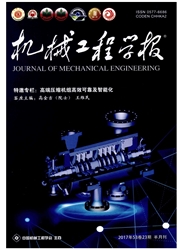

 中文摘要:
中文摘要:
基于粘弹性摩擦层在定子表面的行波超声波电动机接触模型,利用MATLAB方法,模拟分析了摩擦材料的厚度和弹性模量对电动机特性的影响。分析结果表明,摩擦材料厚度越小,弹性模量越大,电动机的负载特性越好。当摩擦材料的厚度在0.5mm以下、负载力矩在36N·mm以上时,界面转换效率值较高。而当磨擦材料的厚度在0.2mm左右时,界面转换效率有一个最大值。因此,摩擦材料的厚度一般应选择0.2mm。当摩擦材料的弹性模量大于1.5GPa时,在较大的负载力矩范围内,电动机的界面转换效率均较高,因此电动机具有较好的驱动能力。这些结果对电动机摩擦材料的选择有一定的理论指导意义。最后将此模型与现今研究较多的柔性转子和刚性定子模型进行了比较。结果表明,以此模型为基础的行波型超声波电动机可以获得较大的输出力矩。
 英文摘要:
英文摘要:
Based on a contact model of traveling wave ultrasonic motor with visco-elastic contact layer on stator surface, effects of thickness of frictional material and its modulus of elasticity on characteristic of the motor are simulated using MATLAB method. The results show that, the thinner the thickness, and the higher the modulus of elasticity, the better the motor characteristics. The interface conversion efficiency is higher when thickness is smaller than 0.5 mm and load torque is greater than 36 N ·mm; It has a maximum when thickness is about 0.2 mm.As a result, it is more suitable to choose 0.2 mm for the thickness of the material. When modulus of elasticity is higher than about 1.5 GPa, the interface conversion efficiency is higher in the greater range of load torque, so the motor has better driving capacity. These results have certain theory directive significance to the choice of the frictional material. This model is compared with the compliant slider and rigid stator model. The results show that, the motor based on this model will gain bigger output torque.
 同期刊论文项目
同期刊论文项目
 同项目期刊论文
同项目期刊论文
 期刊信息
期刊信息
